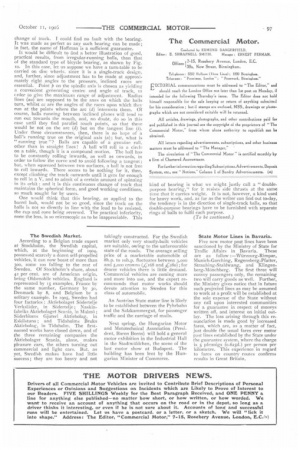The Swedish Market.
Page 5

If you've noticed an error in this article please click here to report it so we can fix it.
According to a Belgian trade expert at Stockholm, the Swedish capital, which, at the beginning of mo4, possessed scarcely a dozen self-propelled vehicles, it can now boast of more than 3oo, some too falling to the rest of Sweden. Of Stockholm's share, about 42 per cent, are of American origin, being Oldsmobile vehicles. England is represented by is examples, France by the same number, Germany by 30, Denmark by 8, and Belgium by a solitary example. In eaci5, Sweden had four factories : Aktiebolaget Sociertelje Verksliider, in SCidertelje ; Naskinfabriks Aktiebolaget Scania, in Malmo; SC;clerbloms Gjuteri Alctiebolag, in Eskilstuna ; and Tidaholms Bruks Aktiebolag, in Tidaholm. The firstnamed works have closed down, and of the three remaining companies the Aktiebolaget Scania, alone, makes pleasure cars, the others turning out commercial and light cars. But, as yet, Swedish makes have had little success ; they are too heavy and not takingly constructed. For the Swedish market only very stoutly-built vehicles are suitable, owing to the unfavourable state of the roads. The average selling price of a marketable automobile of 8b.p. to toh.p. fluctuates between 3,000 and 5,otto crowns (.4168 and 4280); for clearer vehicles there is little demand. Commercial vehicles are coming more and more into use, and the expert recommends that motor works should devote attention to Sweden for this class of automobile.
An Austrian State motor line is likely to be established between the Pyhrbahn and the Salzkammerg-ut, for passenger traffic and the carriage of mails,
Next spring, the Hungarian Motor and Mototechnical Association (President, Baron Borns) will hold a general motor exhibition in the Industrial *Hall in the Stadtwiffilchen, the scene of the last motor show at Budapest. The building has been lent by the Hungarian Minister of Commerce. State Motor Lines in Bavaria.
Five new motor post lines have been sanctioned by the Ministry of State for Traffic Affairs in Bavaria. These are as follow :—Wiirzourg-Rimpar, Munich-Garching, Regensberg-Pfatter, Straubing-Staldwang-, and Klingenberg-Miinchberg. The first three will convey passengers only, the remaining two will carry goods as well. Further, the Ministry gives notice that in future such projected lines as may be assumed to work at a profit will be established at the sole expense of the State without any call upon interested communities for a guarantee in respect of moneys written off, and interest on initial outlay. The loss arising through this renunciation is made good by increased fares, which are, as a matter of fact, just double the usual fares over motor post lines established by the State under the guarantee system, where the charge is 5 pfennigs (o.625d.) per person per kilometre. This experience in regard to fares on country routes confirms results in Great Britain.






















